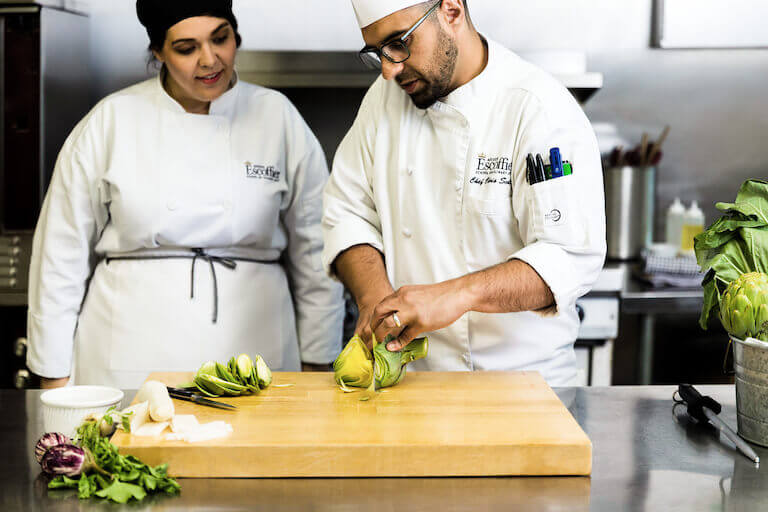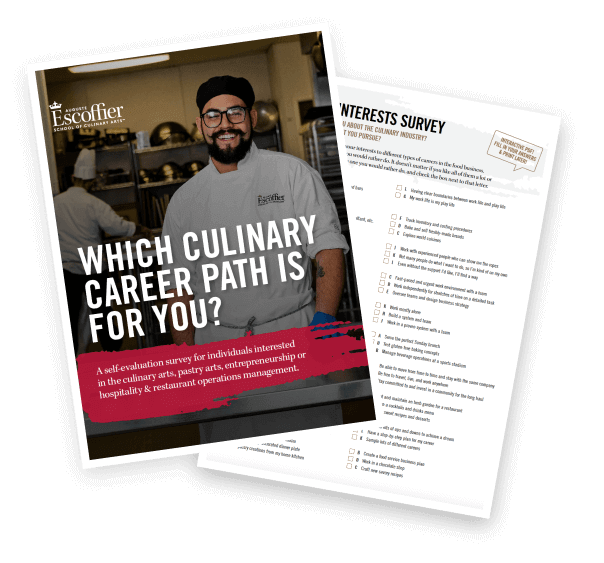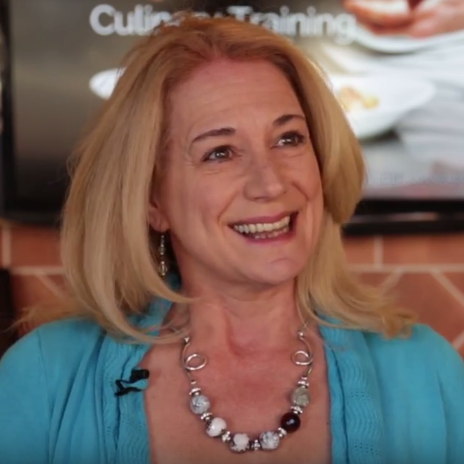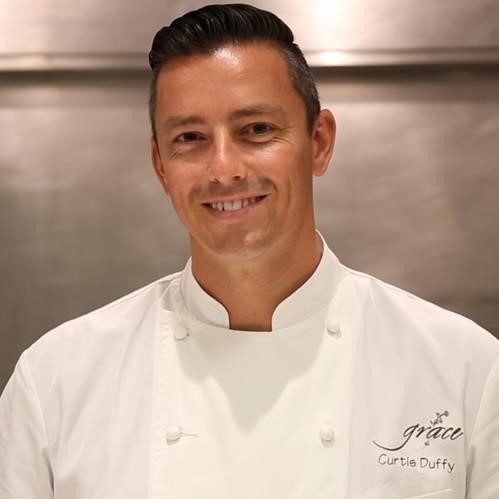After honing your knife skills, practicing developing and combining flavors, and being introduced to new ingredients, many culinary school students graduate with a sense of accomplishment. However, even if you graduate from your program with top marks, don’t think your work is done—you still need to put in a bit more work if you hope to obtain a culinary position.
While culinary school may provide you with knowledge and experience to start a role in a commercial kitchen, it also helps to know what hiring chefs might be looking for from culinary school graduates. For example:
What culinary skills might you be expected to demonstrate to a hiring chef?
What could you need to know about the business side of the food business?
What are the current hiring trends for culinary school grads?
Here’s what chefs are often looking for when hiring, and how Escoffier students can set themselves apart.
Knowledge of the Fundamentals
Hiring chefs know that a recent culinary school graduate will still have skills to learn and sharpen, but they’ll also be looking for a solid foundation of culinary or pastry techniques to build upon.
To start, aspiring chefs and professional cooks will need to know basic knife skills like uniform chopping and grip technique. They’ll also need to understand safe food handling and storage to keep products fresh and prevent cross-contamination.

Escoffier Chef Instructor demonstrating knife skills to a Culinary Arts student
A recent graduate should know how to use common kitchen equipment like fryers, grills, broilers, and commercial stand mixers. And they’ll need to be aware of different flavor profiles and how to balance them in a dish.
“I recruit Escoffier graduates because they come to us ready to hit the ground running…What I think makes Escoffier the best culinary school for us to recruit from is the fact that their graduates are predictable. I know what to expect from them. I know that they’ve been trained properly.”*
Mary Ann Mathieu, Executive Recruiter at Sodexo
Culinary school graduates often come to potential employers well-equipped with these foundational cooking skills. If hiring chefs see a culinary arts diploma or degree from an institution like Escoffier on your resume, it could signify that you’re ready to compete with the very best in the culinary job market.
Plus, the completion of a required industry externship may show that you have the experience required to work in a professional kitchen. An externship not only shows that you’ve worked in the often hectic kitchen environment, but that you also have experience working with a team.
Organization and Cleanliness
The well-known chef Auguste Escoffier played a major role in developing the systems found in many modern restaurants. After recognizing the need for organization in a restaurant, Escoffier invented the brigade de cuisine system where cooks and chef supervisors each have specific roles and stations. It’s an important part of every commercial kitchen that must be taken seriously for both speed and safety.
Employers may expect culinary school graduates to understand the intricacies of this hierarchy system and how to thrive within it. They’ll also expect graduates to take cleanliness seriously, keeping their stations organized, clean, and sanitized to prevent accidents or spills that slow down the team.
“I love hiring Escoffier students…they’re trained in how to handle food properly, they’re trained on how to cook food properly. They’re trained in how to do all of this in a very short amount of time, and they’re organized doing it.”*
Holden O’Leary, Culinary Arts Graduate and Executive Chef at Jolynn’s Food & Spirits
Proper organization is also a key component of food safety and controlling costs. For example, maintaining the correct temperature of the walk-in freezer and refrigerator slows the growth of contaminants and prevents rapid spoilage. And following a first in, first out policy helps reduce food waste and keep costs down.
Passion for the Craft
Working in a kitchen can be rewarding and fun, but it also requires passion and dedication if you hope to achieve success. When you’ve been on your feet for six hours, the kitchen is scorching due to lit burners, and you’ve just hit the dinner rush, it’s easy to give in to exhaustion and pressure. However, the best chefs can use the love of what they do to dig deep and complete their work with finesse.
Most hiring chefs can tell when an applicant is excited about food and cooking and when they’re just looking for a job. The fact that a graduate has invested in a culinary education shows commitment to the art of cooking and a professional culinary or pastry career.
Watch Fall 2021 Escoffier graduates share their excitement for the future.
Hiring chefs know that people who are passionate about food love to come up with new ideas and play with recipes. However, they also know that great culinarians are continuously learning from others and admitting what they don’t know. So graduates must also be coachable as well as eager to gain new skills and techniques from their more experienced colleagues.
A combination of passion, eagerness to learn, and humility are the hallmarks of a culinarian with a bright future.
Practical Business Skills
While knowing about flavors and culinary techniques is one sign of a good candidate, hiring chefs are also looking for a diverse range of skills. One of these is the ability to add value to operations, marketing, and other areas of running a business.
A young chef that can take a few responsibilities off the shoulders of the sous chef and executive chef can be invaluable. This means recent graduates should know how to calculate and control food costs, limit waste, and understand how labor costs affect profit. The ability to place orders and knowledge of basic government regulations also proves useful.
“A balanced [culinary] program starts with obviously understanding the fundamentals of cooking – classes that include how to saute, how to bake, how to roast, steam – the entire cooking methods. It has to have some type of marketing strategy, cost analysis, how to break down numbers, the business side, understanding spreadsheets, how money comes and goes, and how to pay bills.”*
Curtis Duffy, Michelin Star Restaurateur, Celebrity Chef, and Escoffier Advisory Board Member
Escoffier’s Associate Degree in Culinary Arts blends the creativity of the culinary or pastry arts with practical skills in business operations, accounting, and management. Students taking the program’s entrepreneurship course even have the opportunity to create their own restaurant business plan.
While skills such as how to handle a knife or make a perfect hollandaise are important, graduates might consider combining them with overall business knowledge in this competitive and evolving landscape.
Sense of Urgency—with a Positive Attitude
Kitchens move quickly, and staff has to hustle to keep up. So culinary school graduates have to demonstrate a sense of urgency to prove they can maintain pace with the crew during a busy shift.
This doesn’t mean racing around the kitchen, putting yourself or others at risk. Instead, hiring chefs need graduates who move with purpose and always think ahead.
Since they’re often working on more than one dish at a time, chefs have to prioritize and multitask. Making several dishes at once in a hot, enclosed space while more orders continue to roll in can make untested chefs frazzled and short-tempered.
Chefs must be high-energy, but they must also contribute to a positive environment for the rest of the staff. An upbeat demeanor in the face of pressure can change the whole feeling of a kitchen from one of stress to one of camaraderie.
Executive Chef Josh Hasho of Omni Hotels & Resorts explains, “I hire Escoffier students because I’ve noticed a different work ethic that they possess that maybe some other culinary students don’t have. It was very consistent, hard working, positive attitudes. When you’re interviewing someone, you’re really looking for that connection, that high energy level, someone that’s really into getting their foot in the door. I think that goes a lot further than what’s on the piece of paper. That energy level is really what we’re looking for.”*
Omni Hotels & Resorts Executive Chef Josh Hasho says culinary school is a gold star on a resume
An executive chef may not be able to gauge these traits from a simple interview, so culinary or pastry graduates may be asked to “stage” their skills. A stage is a trial shift where the hiring chef can assess your skills in the kitchen in real-time. Chefs can be looking for movement with purpose, high energy, and of course, culinary school fundamentals.

Take the Culinary Career Survey
We’ve compiled a checklist of all of the essential questions into one handy tool: career options, culinary interest surveys, educational opportunities, and more.
When Can You Start?
Basic culinary knowledge is the foundation for any aspiring chef. But it should also be supplemented with practical business skills, passion, organization, energy, and coachability to turn an applicant into a must-hire.
To start down the path towards cooking professionally, learn more about the Culinary Arts and Pastry Arts programs at Escoffier. We work with dozens of employers to help match graduates with industry externships and provide career search assistance.
Did you find this article helpful? Learn more with these resources:
- What Makes a Good Sous Chef?
- How New Chefs Can Stand Out in the Kitchen
- Career Options for Culinary School Graduates
This article was originally published on July 8, 2020, and has since been updated.
*Information may not reflect every student’s experience. Results and outcomes may be based on several factors, such as geographical region or previous experience.

 “I recruit Escoffier graduates because they come to us ready to hit the ground running…What I think makes Escoffier the best culinary school for us to recruit from is the fact that their graduates are predictable. I know what to expect from them. I know that they’ve been trained properly.”*
“I recruit Escoffier graduates because they come to us ready to hit the ground running…What I think makes Escoffier the best culinary school for us to recruit from is the fact that their graduates are predictable. I know what to expect from them. I know that they’ve been trained properly.”* “I love hiring Escoffier students…they’re trained in how to handle food properly, they’re trained on how to cook food properly. They’re trained in how to do all of this in a very short amount of time, and they’re organized doing it.”*
“I love hiring Escoffier students…they’re trained in how to handle food properly, they’re trained on how to cook food properly. They’re trained in how to do all of this in a very short amount of time, and they’re organized doing it.”* “A balanced [culinary] program starts with obviously understanding the fundamentals of cooking – classes that include how to saute, how to bake, how to roast, steam – the entire cooking methods. It has to have some type of marketing strategy, cost analysis, how to break down numbers, the business side, understanding spreadsheets, how money comes and goes, and how to pay bills.”*
“A balanced [culinary] program starts with obviously understanding the fundamentals of cooking – classes that include how to saute, how to bake, how to roast, steam – the entire cooking methods. It has to have some type of marketing strategy, cost analysis, how to break down numbers, the business side, understanding spreadsheets, how money comes and goes, and how to pay bills.”*